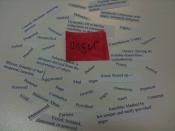Case Study of Andrea - Dysfunctional Anger Management
�
Anger is a very common emotion (Averill, 1983) that can lead people to adaptive behaviors, energizing them to address injustices, assert themselves, or engage in effective problem solving (Novaco, 1985). However, when anger gets out of control and starts becoming the focus of a person's life, it is considered as dysfunctional anger and is well known to clinicians. Some people suffer from chronic generalized anger in which they get provoked easily and experience more frequent and intense anger than their peers (Deffenbacher, 1993). Others present with situation-specific forms of anger (e.g., anger limited to a close relationship, the workplace, or while driving). Still others suppress or deny healthy expressions of anger, often resulting in impaired interpersonal functioning.
Anger is defined as an internal state with emotional/experiential, physiological, cognitive, and behavioral components (Eckhardt & Deffenbacher, 1995; Edmondson & Conger,1996). A heightened propensity to experience angry feelings and dysfunctional forms of anger expression have been associated with a number of health problems (Helmers, Posluszny, & Krantz, 1994; Suinn, 2001), aggressive behavior (Boyle & Vivian, 1996; Dahlen, Martin, Ragan, & Kuhlman, 2004; Deffenbacher, Lynch, Filetti, Dahlen, & Oetting, 2003; Tafrate, Kassinove, & Dundin, 2002), reduced social support (Dahlen & Martin, 2005), occupational distress (Brondolo et al.,
1998), and substance abuse, depression, and anxiety (Deffenbacher, 1992, 1993).
From a cognitive-behavioral perspective, anger can be understood as emerging from the complex interactions of
Eliciting stimuli,
A person's pre-anger state, and
Cognitive appraisals (Dahlen & Deffenbacher, 2001; Deffenbacher, 1996).
Anger-eliciting stimuli include external events (e.g., criticism, traffic delays, etc.) or internal stimuli (e.g., memories, other emotions, etc.). Eliciting stimuli occur in the context of the individual's pre-anger state (i.e., enduring cognitive biases, internalized cultural messages about anger, and one's cognitive-emotional-physical state at the time of provocation) and...


